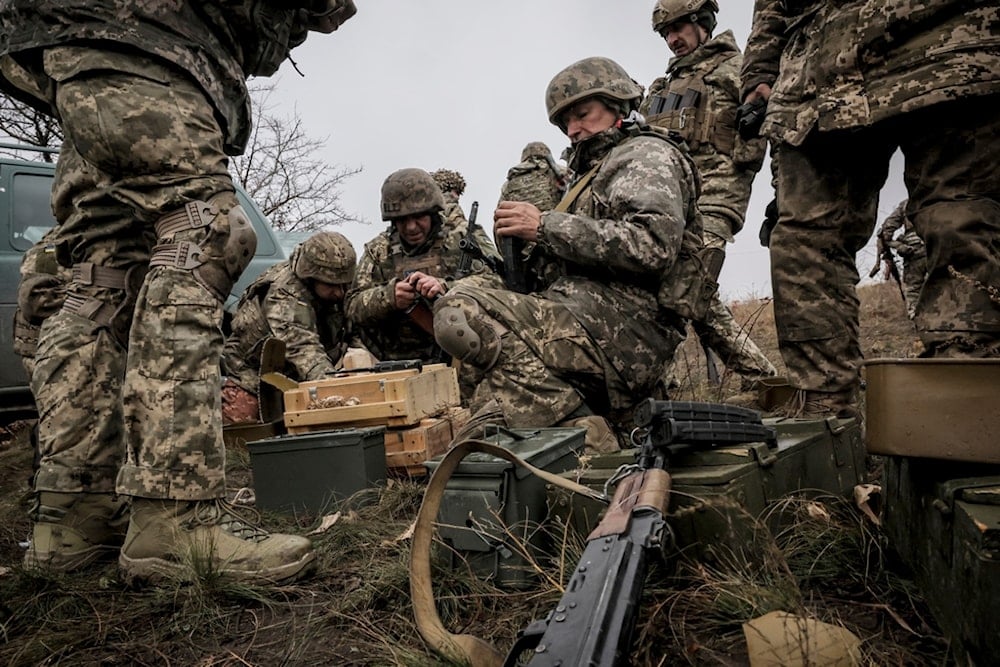France is training Ukrainian soldiers for war in Russia: Report
While France invests its military efforts to train Ukrainian soldiers amid the war with Russia, the Economist does not anticipate a significant difference in the war dynamic to be achieved.
-

In this photo provided by Ukraine's 24th Mechanised Brigade press service, servicemen of the 24th Mechanised Brigade TRAIN their tactical skills at the training field in Donetsk region, Ukraine, Wednesday, Nov. 6, 2024. (AP)
Over 2,000 Ukrainian soldiers, 90% of whom are freshly drafted, are undergoing military training in France ahead of their deployment on the frontlines of the war with Russia.
The idea was generated when Ukrainian President Volodymyr Zelensky visited his French counterpart Emmanuel Macron in Paris last June. The soldiers, currently training in eastern France, are receiving battalion-level exercises to form the backbone of a combined-arms brigade for future operations, and undergoing drills using French military equipment like Caesar howitzers and Milan anti-tank missiles.
The new approach encompasses the decision to train, equip, and supply a Ukrainian brigade through a European force, a shift from the previous American-led effort in Germany before last year's Ukrainian counteroffensive.
The 'Anne of Kyiv' Brigade
This brigade, named "Anne of Kyiv," will include 1,500 soldiers who have already been trained in Ukraine, and will consist of two command posts, three infantry battalions, and comprehensive logistical support. According to French Defense Minister Sébastien Lecornu, a train carrying the first batch of 100 armored vehicles for the brigade is set to depart from France for Ukraine.
The brigade will also receive Caesar howitzers, short-range air defense systems, anti-tank missile launchers, and other equipment, all of which the Ukrainian soldiers are trained to use and maintain. Additionally, French Mirage 2000 fighter jets, modified to carry SCALP cruise missiles, are expected to arrive in Ukraine in the new year.
Lecornu also states that the new training program aims to improve Ukraine's tactical effectiveness on the battlefield. A July report by the Royal United Services Institute (RUSI) highlighted two key challenges in Ukraine's recent counteroffensive operations: the unfamiliarity of Ukrainian forces with foreign-supplied equipment and the lack of coordinated training. The report also noted that at one point, each Ukrainian brigade was operating and trying to maintain up to five different types of armored vehicles, which contributed to operational difficulties.
Colonel Philippe, who is overseeing the final training exercises, notes that the French have had to adjust the program to better match Ukraine's needs on the frontlines by expanding trenches to align with Ukrainian tactics, extending drone training, and focusing the final exercise on defense, testing troops' endurance under stress, with grenades simulating air strikes.
However, this training effort may be too late to make a significant difference, the Economist speculates. Ukraine has lost territory to Russia recently, and its forces are stretched thin while struggling to mobilize new conscripts.
In September, President Zelensky indicated a need for 14 additional brigades, with fewer than four fully equipped despite promises from allies. He further admitted that recent efforts to address troop shortages through tightened mobilization laws have fallen short, leaving the country's military struggling to sustain its defense against Russian forces.
US' absence could garner additional European presence
The political landscape has also shifted, with the election of Donald Trump potentially affecting diplomatic dynamics.
A senior advisor to US President-elect Donald Trump, Bryan Lanza, stated that the incoming administration will prioritize achieving peace in Ukraine rather than focusing on territorial restoration.
Speaking to the BBC World Service’s Weekend program, Lanza emphasized that the Trump administration would ask Ukrainian President Volodymyr Zelensky to present a "realistic vision for peace."
He added that if Zelensky insists that peace can only be achieved by reclaiming Crimea, it would demonstrate a lack of seriousness in negotiations, declaring, "Crimea is gone."
Trump has consistently stated that his priority is ending the war in Ukraine, and addressing what he sees as a drain of US resources through military aid, however, according to BBC's report, he has not yet revealed how he plans to achieve this.
While French President Macron remains a strong supporter of Ukraine, he and other European leaders fear their influence over future decisions may be limited. Their best hope now may be to help Ukraine gain any tactical advantage to strengthen its position in upcoming negotiations.
Former UK Prime Minister Boris Johnson warned that the country may need to send troops to Ukraine if newly reelected President Donald Trump scales back US financial or military support, reported Newsweek.
In an interview for GB News, Johnson explained that failing to back Ukraine could lead to higher costs for the UK and pose a threat to European security, suggesting that in such a scenario, it would be preferable for Britain to deploy troops to fill the gap left by reduced US aid.
UK Prime Minister Keir Starmer recently held talks with French President Emmanuel Macron to discuss strategies for preventing Donald Trump from reducing US support for Ukraine. The two leaders also sought to encourage President Biden to permit Ukraine to use Storm Shadow missiles against Russian targets.

 5 Min Read
5 Min Read









